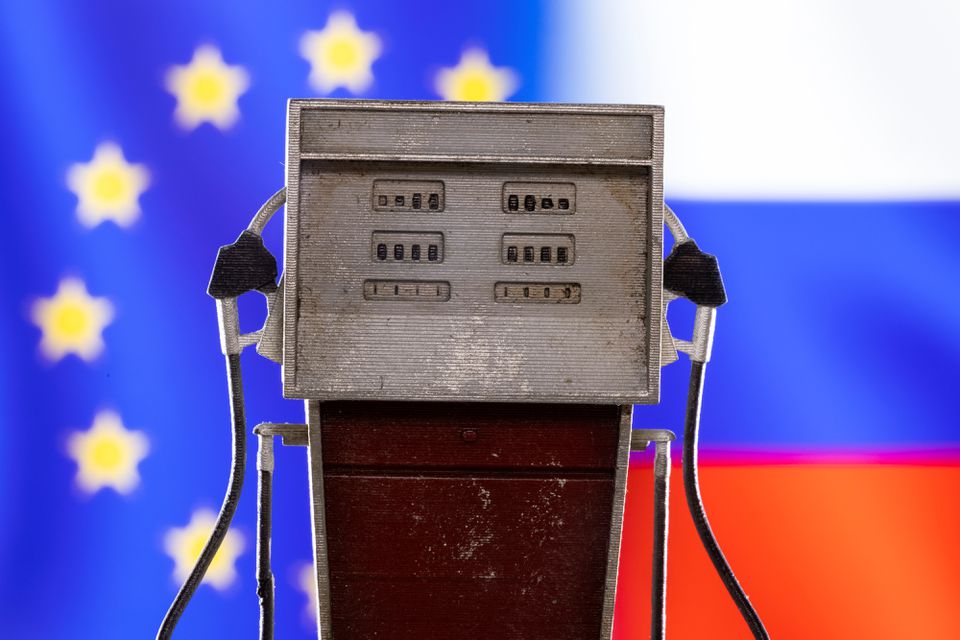LONDON, May 4 (Reuters) – The European Union has proposed a phased embargo of Russian oil, tightening its sanctions on Moscow for its invasion of Ukraine. What would the impact be of banning Russian barrels in Europe?
WHAT DOES THE EU CURRENTLY IMPORT?
The European Union imported 2.2 million barrels per day (bpd) of crude oil and 1.2 million bpd refined oil products before the war in Ukraine, according to the International Energy Agency (IEA).
Filling up your car will probably get more expensive. Europe imports not only crude oil from Russia but also refined oil products, such as diesel to fuel industrial and passenger vehicles. Importing diesel from further afield than Russia will mean increased freight costs and thus higher prices at filling stations. In Germany, for example, 74% of diesel imports before the war came from Russia, data from consultancy FGE Energy shows. Russian oil makes up a fifth of oil refined in Europe, according to the IEA.
Some refineries producing fuel from gasoline to jet fuel such as Germany’s PCK Schwedt and Leuna as well as refineries in the Czech Republic, Hungary, Slovakia and Poland get fed Russian crude oil via the Druzhba – or “Friendship” – pipeline.
Supplies along Druzhba have been fluctuating sharply in recent years with deliveries running as high as 1.5 million bpd while declining in recent months including February to around 0.8 million bpd.
Poland can switch to seaborne supplies from places like Saudi Arabia or Norway via the Gdansk port in the Baltic Sea.
PCK Schwedt, which supplies cars and airports in Berlin and the region, and Leuna near Leipzig could get some oil from the German Baltic sea port of Rostock – much less of a crude oil hub than Gdansk – but not enough for them to run at full capacity.
Poland, itself trying to replace all Russian crude in its refineries, could route some of the oil arriving in Gdansk to these two German refineries, but the details have not been worked out yet.
Changing these supply routes will most likely mean higher feedstock prices for two of Germany’s biggest refineries, feeding into higher prices for end consumers.
For all the refineries in landlocked countries, making up for zero oil via Druzhba will be a mammoth task. It is likely to involve more expensive and less efficient transport via trucks, railways, rivers or the future extension of other pipelines such TAL going from the Mediterranean via Austria to Germany. Such an extension still needs approval from southern German authorities.
Slovakia, Bulgaria and the Czech Republic are seeking exemptions from an imminent EU ban on Russian oil to sort such alternatives, while Hungary does not support the plans out of fear for its energy security.
Refineries are typically set up to run on a specific type of crude oil, such as Russia’s prime export grade Urals. Other types of crude from Norway, the Middle East, the United States or West Africa can be blended or the refineries revamped, but this can change the yield of a refinery and cost more money in addition to higher freight costs.
Traditional consumers of Russian oil will also now have to compete not only with each other for alternative oil imports but also with existing customers in Asia.
An oil refinery cannot simply be switched off as a restart is expensive and complex.
Globally, refining capacity is shrinking as the world tries to reduce its dependence on oil-based fuels. Morgan Stanley estimates that capacity has shrunk by as much as 2.7 million bpd since the onset of the coronavirus pandemic.
With the re-emergence of economic growth as lockdowns come to an end, refining margins have sky-rocketed , meaning refineries will try to squeeze as much fuel as possible into the market.
Refineries that have the toughest supply issues, however, are likely to see lower margins because their crude costs will rise, so operators may slow processing. Countries and refiners typically also have storage tanks which they can tap in case of short-term disruptions. EU countries have until the end of the year to prepare for the disruption and would likely fill storage in areas near refineries that might struggle.
It would cause more severe disruptions, if Russia cuts supplies first.
Germany has warned of a recession without Russian oil and gas.









